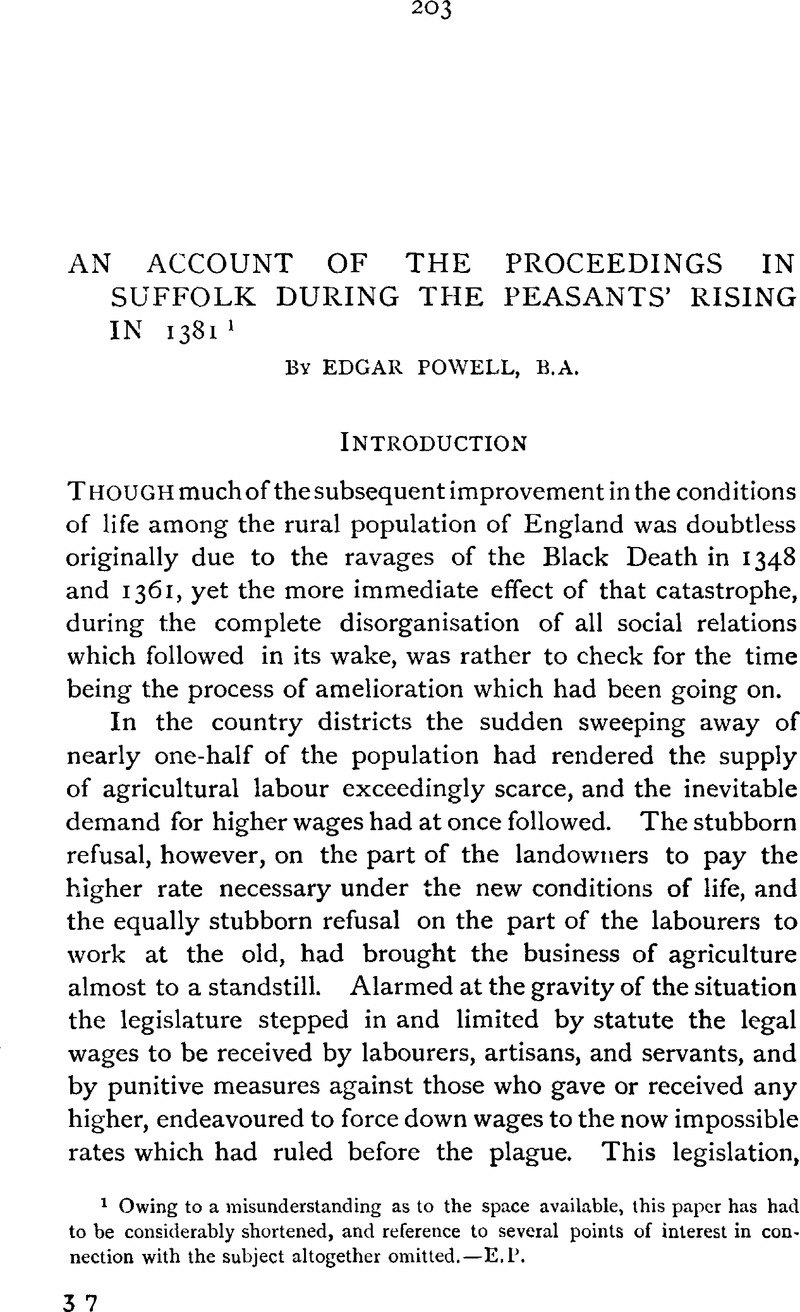No CrossRef data available.
Article contents
An Account of the Proceedings in Suffolk during the Peasants' Rising in 13811
Published online by Cambridge University Press: 12 February 2009
Abstract

- Type
- Other
- Information
- Copyright
- Copyright © Royal Historical Society 1894
References
page 204 note 1 This penalty could be enforced if the prosecuting party wished it. It was, however, ordered that the branding-iron should be kept in custody of the sheriff. (See Statute 34 Ed. III.)
page 207 note 1 Q.R. Memoranda Roll, 4 Ric. II., Brevia, m. xxv.
page 207 note 2 L.T.R. Enrolled Accounts. (Subs.) No. 13; under ‘Villa Leycester,’ ‘quod collectores idem subsidium integre levaverunt et collegerunt ut rex intellexit.’
page 207 note 3 L.T.R. Orig., 4 Ric. II. m. 12 and 13.
page 208 note 1 The account of one of the inspectors, Thomas Sayvill, who was sent to Notts and Derbyshire, is extant. He left London on April 30, 1381, and returned on August 4, and his expenses were is. 6d. per day for the ninety-six days he was away. Exch. Q.R. Misc. ![]() .
.
page 209 note 1 L.T.R. orignalia, 4 Ric. II. m. 49. To the Archbishop of Canterbury. Dated December 20, 4 Ric. II.:
‘Quod omnes et singuli prelati etiam regulares cujuscunque gradus status ordinis sexus vel condicionis fuerint ac clerici quomodocunque promoti etiam si exempti privilegiati qualitercunque fuerint omnesque presbiteri non promoti tam regulares qiiam seculares ac etiam moniales infra vestram piovinciam constituti omneaque et singuli advocati procuratores examinatores registraiores et notarii publici singuli videlicet viginti grossos omnesque et singuli diaconi subdiaconi accoliti et alii inferiores etatis sex decem annorum el ultra in gradu et habitu clericali quomodolicet existentes qui mendicantes notorie non fuerint tres grossos nobis terminis supradictis persolvent.’
page 213 note 1 A Johannes de Rokwood was escheator for Norfolk and Suffolk in 1375. Rjmer, iii. 1044.
page 214 note 1 Probably from the French, meaning set with stones.
page 216 note 1 Coram Regc Roll, 476, Rex 1.
page 217 note 1 Brounfeld appears to have been confined also at Corfe Castle, and at Not tingham. He was eventually made Bishop of Llandaff.
page 219 note 1 Coram Rege Roll 484, Rex 26.
page 222 note 1 See pedigree of family, Add. MSS. 19117, Brit. Mus.
page 223 note 1 The date given here for this attack on Lakenheath is Corpus Christi day, 5 Ric. II. [1382] I think, however, from several considerations that this was a slip on the part of the scribe, and should have been written 4 Ric. II. [1381].
page 223 note 2 Rich. Talmache and John Battisford are described in the indictments as chief leaders of the insurgents in the hundred of Wylford.
page 225 note 1 John de Sutton, M.P. of Suffolk in 1377.
Page 234 note 1 From an extent of the manor of Hawsted, it appears that there were at Hawsted in 1358, thirty ‘libere tenentes,’ two of whom lived at Bury, and eleven ‘nativi.’ The former class held only 104, acres between them, many apparently not holding any land at all, while the latter class held 146¼ acres. On comparing these figures with the poll tax record, we find that the number of householders given there as laboratores and artifices together is twenty-six, and that of the servientes eleven, a coincidence of numbers which seems to point to the use of the word servientes in the poll tax as equivalent to ‘nativi,’ and that the laboratores and artifices corresponded very much to the ‘libere tenentes’ of the manors. On comparing the names in the two documents, one is struck at once by the great change which had taken place in them, for of the thirty ‘libere tenentes’ in 1358 only four, viz. John Ward, John Boydyn, John Kertlyng, and William Walklynge appear in the poll tax, and of the eleven nativi only one, Thomas Frame, remains. Such a change, I think, can only be accounted for on the supposition that this parish was subjected to a very severe visitation of the plague in 1361 or 1369.


